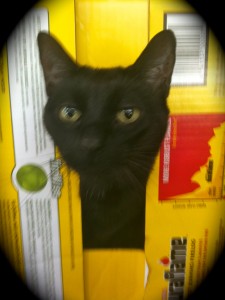

This year I switched the focus of my social media efforts to Twitter, because it seemed to me Facebook was an increasingly ineffectual way to reach fans. Because of that, I’ve been spending a lot more time looking at the people following me on there as well as thinking about Twitter, its philosophy, and its uses overall.
Why does a writer want to be on Twitter? The reason is more than just “sell books”. It’s often a way to network with existing fans (who will buy more books in the future), cultivate new fans, connect with peers and other industry professionals, to find out industry and writing news and yes, of course, to procrastinate in a thousand different ways.
I used to automatically follow people who followed me but nowadays I spend a few minutes to click through and look at their page and the tweets it contains. I’ve noticed that a lot of people are doing it “wrong,” or at least in a way that ends up detracting from their purpose. Most of these are easy fixes. Here’s some tips for setting up an account on there and as well as for maintaining a presence.
...

The Amazon Affiliate Program: What’s Changed Recently
You may have heard that Amazon has changed its terms for its affiliate program. Here is the change.
“In addition, notwithstanding the advertising fee rates described on this page or anything to the contrary contained in this Operating Agreement, if we determine you are primarily promoting free Kindle eBooks (i.e., eBooks for which the customer purchase price is $0.00), YOU WILL NOT BE ELIGIBLE TO EARN ANY ADVERTISING FEES DURING ANY MONTH IN WHICH YOU MEET THE FOLLOWING CONDITIONS:
(a) 20,000 or more free Kindle eBooks are ordered and downloaded during Sessions attributed to your Special Links; and
(b) At least 80% of all Kindle eBooks ordered and downloaded during Sessions attributed to your Special Links are free Kindle eBooks.”
This affects people who rely on posting free books as part of their business model. The reason you’d drive traffic to free books is because Amazon’s rates change depending on the total number of books sold.
For example, let’s say I sell some books for Amazon by blogging about a book and pointing to Amazon with an affiliate link, a specially constructed URL that points to the book on Amazon. I get a very small percentage of each sale. That percentage can differ according to what merchandise it is, but it also differs according to how many items I’ve sold that month if it falls in the “General Product” category.
So let’s say I do that. Perhaps I mention that I often use Samuel R. Delany’s wonderful About Writing in teaching. Over the course of a month, three people buy the book (in my experience this is an optimistic estimate. Let’s say that’s all the traffic I drive this month. Because I’ve only sold 3, my percentage is 4%.
...

On the one hand — and this is certainly how the marketers eying all those tasty bits of data would like you to think of it — you are engaging in social expression, you are singing to the world with your own individual song made up of pop culture references and color preferences. You are bonding with that cousin in Colorado, that sister-in-law of a friend, or even your bff. You are finding the gems of the Internet and sharing them. For me as a writer, I’m (or at least I hope I am) continuing to build and deepen my fan base, so they’ll buy my books.
But the other hand is more sinister. You’re providing marketers with your data, telling them how to most effectively sell to you, letting them know what images, what songs, what memes have resonance for you. Talk about the ultimate consumer survey – this one’s as long and exhaustive as you care to make it. Everyone who uses Gmail (and I’m one of them) has more than once been spooked at how the ad in the sidebar seems to target exactly what you’re thinking of with a precision worthy of a Twilight Zone episode. Imagine if every ad getting served to you is precisely tailored to convince you that you need that particular thneed.
This worries me. We are imperfect creatures, our brains are easily tricked, and subliminal tricks can be played upon us. Oxytocin makes us more trusting, advertising surrounds us on an unquestioned daily basis, and we are, after all, predictable and manipulable creatures.
Or what would a game tweaked to our individual quirks be like? (I envision something for myself filled with Amazons, talking animals, an assortment of literary figures ranging from Geoffrey Chaucer to James Tiptree Jr., and pop culture references to children’s cartoons from the late sixties to early 70s.) Such a game, perhaps one formulated with by then automated algorithms of gripping narrative construction, would be awesome.
And on that sinister hand again, it would be so addictive. I say that as someone who gave at least three night a week to D&D all through my high school years, as a WoW player since the beta, as someone who laid a decade and a half of work on the altar of the entity known as Armageddon MUD, which has eaten lives, grades, careers, friendships, and even marriages over the course of its existence. The thought of a game more addictive than that terrifies me.
So while I’m not quite so worried about my data getting used nowadays, I do have concerns about the future and how my data footprint may someday be used. So what are strategies for dealing with this concern? None seem perfect, but three spring to mind.
So what to do? I guess the first step is realizing there’s a problem. What do you think, am I just being paranoid and should break out my tinfoil hat or begin preserving my precious bodily fluids from contamination? Or is this something we should all be thinking about?
(And if I die under mysterious circumstances in the next couple weeks, it only confirms the corporate assassins exist…)
Enjoy this musing on social media for writers and want more content like it? Check out the classes Cat gives via the Rambo Academy for Wayward Writers, which offers both on-demand and live online writing classes for fantasy and science fiction writers from Cat and other authors, including Ann Leckie, Seanan McGuire, Fran Wilde and other talents! All classes include three free slots.
Prefer to opt for weekly interaction, advice, opportunities to ask questions, and access to the Chez Rambo Discord community and critique group? Check out Cat’s Patreon. Or sample her writing here.
...

All Facebook
Current and breaking information about Facebook.
All Twitter
Current and breaking information about Twitter.
Electronic Privacy Information Center
Social media and privacy issues.
Google+ Developer Blog
Best source for finding out about changes and new features to Google+
Mashable.com’s Social Media Section
News blog that covers many areas of tech news, including social media.
Search Engine Watch
Search Engine Watch provides tips and information about searching the web, analysis of the search engine industry and help to site owners trying to improve their ability to be found in search engines.
Social Media Today
Social media news.
TechCrunch
Technology industry news.
Cat’s Social Media Links on Delicious
This is where I store useful links related to the class.
...

I’ll be posting several pieces over the next week with information gathered for the Bellevue College blogging class, whose second session takes place this Saturday. I teach an online class for writers interested in building an online presence; the next one is July 23, 2012. We’ll be talking about social networking and social bookmarking, which are two related but different concepts. Social bookmarking sites include Delicious, Digg, and Reddit along with the largest one of them all: StumbleUpon.
What is StumbleUpon?
StumbleUpon is a social bookmarking site. Users submit links to content they want to share, an act that is called “stumbling” the link. Other users can give a link a thumbs up or a thumbs down using the StumbleUpon toolbar, which a user can install when registering a StumbleUpon account. Content is tagged according to interests, and users randomly browsing content (also called “stumbling”) will see more popular content more often.
...

So – it’s weird, but they all have such a different vibe for me that I find myself posting different stuff depending on what the network is, and this, I think, leads to a certain amount of inefficiency and wasted time, which since in theory I am a fiction writer more than I am a blogger is something I should curb.
I’ve pretty much abandoned Livejournal, and I don’t know whether that’s a good or bad thing. I should probably set up a widget to collect G+ posts or Twitter tweets on there. Google+ is great (and my favorite, truth be told), but not everyone is on there. I use it a LOT for class stuff.
Facebook is where almost all of my family members are (and where I get most of my baby pictures, between certain people named Corwin, Dresden, Leeloo, and Mason) and it’s also where I seem to talk about politics the most. Twitter and I have an on-again, off-again relationship, and I always feel like I’m missing parts of the conversation on it in the BLAST of stuff from the firehose of tweets constantly crawling up my page. And then there’s this blog as well.
One of the things hampering me in setting up a good system is a feeling that too much social interaction can be a bad thing — that people will unsubscribe if there’s too much, and it seems as though that varies from one network to another. I like Jay Lake’s Link Salad — and maybe one thing to do is collect the links and stuff posted on other networks to present here in a weekly entry. Is that something people who read this blog regularly — or sporadically — would find useful?
And should I be posting the same stuff on all the networks? I took a look at what I’d posted over the course of one day on FB, Twitter, and G+ and while some stuff got crossposted, there wasn’t a lot of overlap.
Part of the reason I’ve never cottoned to Twitter is that it feels like you’re shouting all the time. I like being able to like or + a comment to show I read and appreciated it without feeling like I have to say something. And conducting a conversation on the latter two feels like…a conversation, while Twitter feels like shouting across a room of people who aren’t particularly interested (or else are overly so) interested in the conversation.
What do you think – how much social networking is too much? Do you stick to a particular network or employ the same scattershot approach?
Enjoy this advice about social media for writers and want more content like it? Check out the classes Cat gives via the Rambo Academy for Wayward Writers, which offers both on-demand and live online writing classes for fantasy and science fiction writers from Cat and other authors, including Ann Leckie, Seanan McGuire, Fran Wilde and other talents! All classes include three free slots.
Prefer to opt for weekly interaction, advice, opportunities to ask questions, and access to the Chez Rambo Discord community and critique group? Check out Cat’s Patreon. Or sample her writing here.
...
More links from the Blogging 101 class, this time dealing with Facebook and Twitter.
Mentioned in class:
Facebook news ““ allfacebook.com
How to Stop Facebook from Posting Recent Activity to the News Feed – http://www.allfacebook.com/facebook-recent-activity-2010-01
...
As part of the Blogging 101 class I just finished up teaching for Bellevue College, I organized a bunch of my links into a handout. Here is the General Social Media Resources section.
...

Flash fiction, short-short stories under 1000 words, present stories in microcosm, slices of life that illuminate and change us. In this writing class, students will use writing prompts and word games to create 3-4 pieces of flash fiction, as well as learning what magazines specialize in flash fiction and how to submit their efforts to them.
I’ll be drawing on the experience of a workshop I taught for Johns Hopkins Continuing Studies a while back. That class ran six sessions, if I’m remembering correctly, and we had an amazing time.
I’ll also be teaching the Blogging and Social Networking 101 class. It runs two classes, the first of which is used to talk about setting up a blog, establishing your online presence, personal branding and the second of which is devoted to social networks, Google Analytics, and other Internet tools.
...
 It’s natural for writers to want to spread word of our work. We all realize that, short of hiring a publicist, we’re our own best champions. But if we go too far, or are too single-minded in that pursuit, we can come off as boorish and arrogant.
It’s natural for writers to want to spread word of our work. We all realize that, short of hiring a publicist, we’re our own best champions. But if we go too far, or are too single-minded in that pursuit, we can come off as boorish and arrogant.
To do it successfully, keep some things in mind.
...
Want access to a lively community of writers and readers, free writing classes, co-working sessions, special speakers, weekly writing games, random pictures and MORE for as little as $2? Check out Cat’s Patreon campaign.

"(On the writing F&SF workshop) Wanted to crow and say thanks: the first story I wrote after taking your class was my very first sale. Coincidence? nah….thanks so much."

(fantasy, flash fiction) The mouse sang to the moon. He sang, “Great Wheel of Cheese in the sky, eaten by the Mysterious and restored each month to hover again, grant me a favor. Grant me a bride.”


This site is protected by reCAPTCHA and the Google Privacy Policy and Terms of Service apply. This site is a participant in the Amazon Services LLC Associates Program, an affiliate advertising program designed to provide a means for sites to earn advertising fees by advertising and linking to Amazon.com.